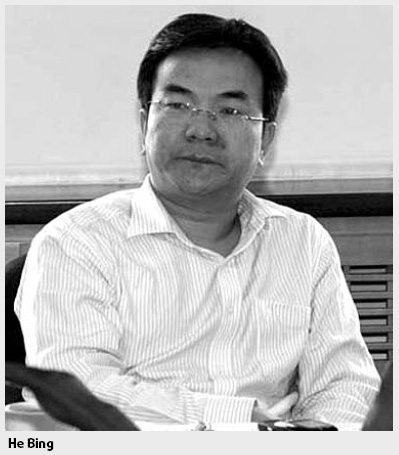Op-Ed Contributors
Independent justice crucial for harmony
By Ku Ma (China Daily)
Updated: 2009-12-24 07:48
 |
Large Medium Small |

He is furious at the death of Tang Fuzhen, who committed self-immolation in protest against the forcible demolition of her house in Chengdu in Sichuan province last month. In his blog, he has even posted illustrations of "martyrs" to mark the tragedies. But unlike professors, lawyers and journalists engaged in a heated debate, his focus is not on how to change the property expropriation regulation. Instead, he says, it is high time the government introduced administrative courts to better fulfill the Supreme People's Court's motto of "justice serves the people".
He Bing, a professor at China University of Political Science and Law, says that the country needs independent organs to hold trials on cases between local governments and individual or group of citizens. But his call for independent trials does not mean separation of powers. Rather, he wants to free the administrative panels of local courts.
He says the lack of independent trials is to blame for rising cases of shangfang - filing of petitions by people who can get nowhere in courts. He has a point there, for even though there is no concrete official data on petitioners, a huge number of people flock to Beijing or provincial capitals to file petitions.

On Monday, the Chinese Academy of Social Sciences released its "Blue Book 2010", which says the country could witness a huge number of "mass incidents" next year because people in many places have for long been angry with local governments. To tackle this thorny issue, it is most important that the country changes the judicial system, He says.
Under the Organic Law of the People's Courts, judicial power is exercised by courts at four levels: Basic people's courts (courts at the county or district level), intermediate people's (prefecture-level) courts, higher people's (provincial-level) courts, and the Supreme People's Court, which is directly answerable to the National People's Conference (NPC), the nation's top legislature. The country has some special courts, too, such as military courts, maritime courts and railway courts.
| ||||
The local courts depend heavily on local governments for almost everything, from human resources to finance. "Many people feel hopeless when they find out that the courts actually are in league with the local authorities.
"It's sad that some people (like Tang) commit suicide instead of seeking administrative reconsideration or the help of litigation when governments infringe upon their rights," says He, a scholar who netizens believe "speaks for the grassroots people".
Tang and her husband didn't file a lawsuit against the local authorities after the Chengdu city management bureau upheld the Jinniu district bureau's decision on the demolition of their house. "The Tangs didn't file a case, and the city management authorities concluded that the couple had admitted that their house was built illegally. But is that true?" He says. "Or does that mean they had no faith in the judiciary?"
In 1999, courts across the country tried about 6.23 million cases. Last year, that figure rose to 9.83 million. But the number of administrative lawsuits dropped from 99,000 to 92,000. "From the figures, we can see that people are gradually losing confidence in administrative reconsideration and administrative litigation," he says. Take the example of France as a contrast. The European country has a population of only about 64 million, compared to our 1.3 billion, but deals with about 190,000 administrative lawsuits a year.
Based on his personal experience of dealing with a case against a local government in Zhejiang province, He says it's very difficult to sue a local government. The local authorities there allowed a developer to build a mansion without land permit - which was clearly illegal. But the local lawyers dare not sue the government despite residents' desperate efforts to safeguard their environment.
Bemoaning the predicament caused by the lack of independent administrative courts, He says it is sad "when people's rights are infringed upon and they appeal to higher administrations only to discover the higher ranking officials are standing with the authorities". People then turn to courts, "but the courts, too, turn out to be in league with the local governments".
The arduous but inevitable change in the judicial system should start with the reform of the administrative litigation system: Separation of the administrative panels from the local courts.
He says the government can set up three levels - basic, intermediate and higher - of administrative courts under the Supreme People's Court. And only the NPC should have the authority to appoint judges in these administrative courts. This will ease the burden of the supreme court, which has no less than 600 judges. The Supreme Court need not be "the biggest court and have the heaviest burden, too".
"Many of the cases, in fact, should be resolved in lower-level courts," He says. For that, many judges of the Supreme People's Court can be appointed as high-ranking judges in the administrative courts. And to guarantee that the administrative courts are fair and just in their dealings and verdicts, the judges should serve for about three years in one place and then posted to another place across the country.
Apart from the introduction of administrative courts, the administrative reconsideration should, as is done in South Korea, invite law professors and other legal experts to help with the decisions. This will give greater play to independent third parties and make the judgments just and fair. Also, we should resolve as many cases as possible through administrative reconsideration. He suggests the idea to prevent a "huge" number of cases from choking the administrative courts and making the system inefficient.
He says administrative litigation reform will lessen the troubles created by the rising number of petitions. Another important function of the administrative courts would be to help decision-makers to draft policies. "When there is a rapid rise in the number of similar cases, the administrative courts can send feedbacks to the government to adjust certain wrong policies."
He says he has seen a great deal of social improvement over the past three decades and is optimistic about the country's progress toward the rule of law. "China's judiciary has reached a low ebb, but that's also a good time to bottom out."
(China Daily 12/24/2009 page9)













